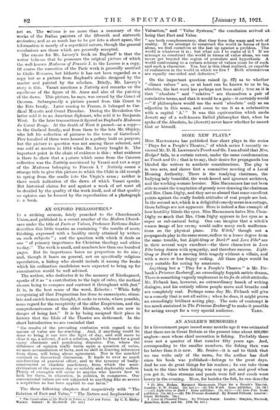AN OXFORD PHILOSOPHER.*
IN a striking sermon, lately preached to the Churchmen's Union, and published in a recent number of the Modern Church- man under the title of Facts or Values, Professor Bethune-Baker
describes this little treatise as containing " the results of acute thinking, expressed with a lucidity rarely attained by writers on such subjects " ; and the question with which it deals as one " of primary importance for Christian theology and ethics to-day." The work is small, and numbers less than one hundred pages. But its importance bears no proportion to its size ; and, though it bears on general, not on specifically religious speculation, a bishop who should include it among the books which his ordination candidates were expected to bring up for examination would be well advised.
The author, who dedicates it to the memory of Kierkegaard, speaks of it as " a contribution to the logic of value, the method chosen being to compare and contrast it throughout with fact."
It is, in the best sense of the word, Eclectic : " While fully recognizing all that Pragmatism has done to emancipate, stimu- late and enrich human thought, it seeks to retain, where possible, some regard for the receptivity of the older Empiricism, and the comprehensiveness of the older Idealism, which are now in danger of being lost." It is by being assigned their place in history that the Idols of the Theatre are dethroned. In the short Introduction we are reminded that
" the results of the prevailing confusion with regard to the nature of value are far-reaching. And, if anything could- be done to bring it out into the light of day, and still more -to clear it up, a solvent, if not a solution, might be found for a good many obstinate and perplexing disputes. For, where the difference of opinion really turns upon a question of value, no mere accumulation of facts, and no skill in drawing inferences from them, will bring about agreement. Nor is the mischief confined to theoretical discussion. It leads to ever so much misdirection of practical effort, and to the tyranny of badly- constructed or obsolete machinery, from which the semi- civilization of the present day so notably and deplorably suffers. Plenty of examples will occur to anyone who knows how to look for them, in education, in politics, in commerce. Our conventional values are not subjected to anything like so severe a scepticism as has been applied to our facts."
The three following chapters deal respectively with " The Relation of Fact and Value," " The Nature and Implications of
• The Construction of the World in Terms of Fact and Value. By C. T. Harley Walker. Oxford : B. Blackwell. [3s. net.]
Valuation," and " Value Systems," the conclusion arrived at being that Fact and Value
" are both complementary, that they form the warp and web of reality. If we attempt to construct the world in terms of fact alone, we find ourselves at the last up against a problem. The- world is whatever it is ; but what am I to make of it ? If we attempt to construct the world in terms of value alone, we can never get beyond the region of postulate and hypothesis. A world conforming to a certain scheme of values must be of such and such a character. Yes, but is this ideal realized, or capable of realization in the world in which we live ? Both alternatives are equally one-sided and defective."
On the - important question • raised (p. 87) as to whether " climax values " are, or at least can be known to us to be, absolute, the last word has perhaps not been said ; true as it is
that " absolute " and " relative " are themselves a, pair of correlative terms, and that it would be a gain—it certainly would
—" if philosophers would use the word ' absolute ' only as an adjective in this sense, and cease to use it as a substantive
with a capital A.' " It was this equivocation which made Jowett say of a well-known Balliol philosopher that, when he spoke of the Absolute, he (Jowett) never knew whether he meant God or himself.






























 Previous page
Previous page